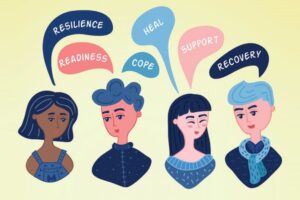Can my Injury affect my Mental Fitness?
When we experience a physical injury, it’s easy to focus solely on the physical healing process and overlook the potential impact on our mental fitness. However, it’s crucial to consider how your mental well-being is affected during this time, as it plays a significant role in shaping your overall experience and recovery journey. Your mental fitness influences how you perceive your injury, cope with the associated pain, and stay motivated throughout the healing process. Recognising and addressing the mental side of recovery ensures a more comprehensive and balanced path to wellness.

Physical Fitness and Mental Fitness
The physical and mental benefits of exercise are well known, and it’s no surprise that staying active helps improve your mood and manage stress. But when an injury disrupts your routine, it can have a significant negative impact on your well-being. This is why it’s crucial to find “workarounds” like aqua jogging or other forms of adapted exercise to keep moving and maintain that “feel-good” factor. The endorphins your body releases during exercise are essential for mood and stress management, and losing that outlet can make you feel out of balance.
Poor mental health can also slow down your recovery. Studies have shown that emotional responses to injury can prolong the healing process. For example, a study titled “How Mental Health Affects Injury Risk and Outcomes in Athletes” highlighted that developing a mental health condition after an injury can significantly extend your recovery time. Simply put, your emotional state can impact how quickly you heal.
 Beyond the length of recovery, poor mental fitness can also affect how you experience pain. If you’re dealing with symptoms of depression, you may find that your pain feels more intense than it does for someone without those emotional challenges. How you feel emotionally plays a role in how your body perceives pain.
Beyond the length of recovery, poor mental fitness can also affect how you experience pain. If you’re dealing with symptoms of depression, you may find that your pain feels more intense than it does for someone without those emotional challenges. How you feel emotionally plays a role in how your body perceives pain.
Foot and lower limb injuries can interfere with many aspects of your daily life, impacting your quality of life both physically and mentally. You may find yourself losing self-confidence and feeling less able to take care of yourself. If walking or daily activities become painful, it can lead to negative thoughts and a less optimistic view of your recovery.
Visible injuries, such as those involving the skin or structure of your foot, may also affect your self-confidence. You might feel uncomfortable doing the things you love or wearing what you used to, leading to a restricted lifestyle and reduced quality of life.
Improve You Mental Fitness
To support your mental health as you recover, here are some strategies you can try:
- Maintain a positive outlook and follow your health care professional’s advice closely.
- Practice meditation or mindfulness to stay centered.
- Remember that your situation is temporary, and healing is part of the process.
- Talk to friends and share your feelings.
- Find alternative exercises that are suitable for your current condition.
- Stay occupied with a hobby or activity you enjoy.
- Surround yourself with supportive company and avoid isolation.
- Seek help if your feelings become overwhelming or hard to manage.
Staying mentally fit during your recovery is just as important as your physical healing. By addressing both, you can work towards a full recovery and return to doing what you love, pain-free and with renewed energy.
We are here not only to treat and advise on foot health condtions but to listen and guide, please book an appointment with us today.
 If you are struggling, or know anyone that is struggling with Mental Health, don't be afraid to seek help. Below may be some helpful resources for your friends and whanau.
If you are struggling, or know anyone that is struggling with Mental Health, don't be afraid to seek help. Below may be some helpful resources for your friends and whanau.


